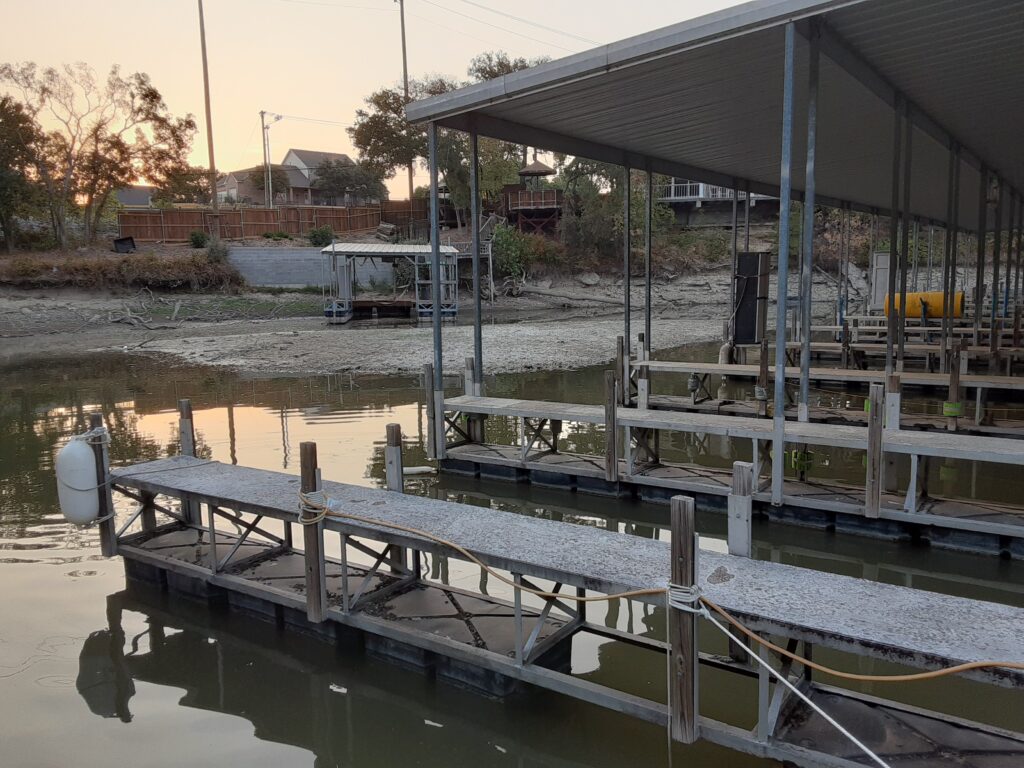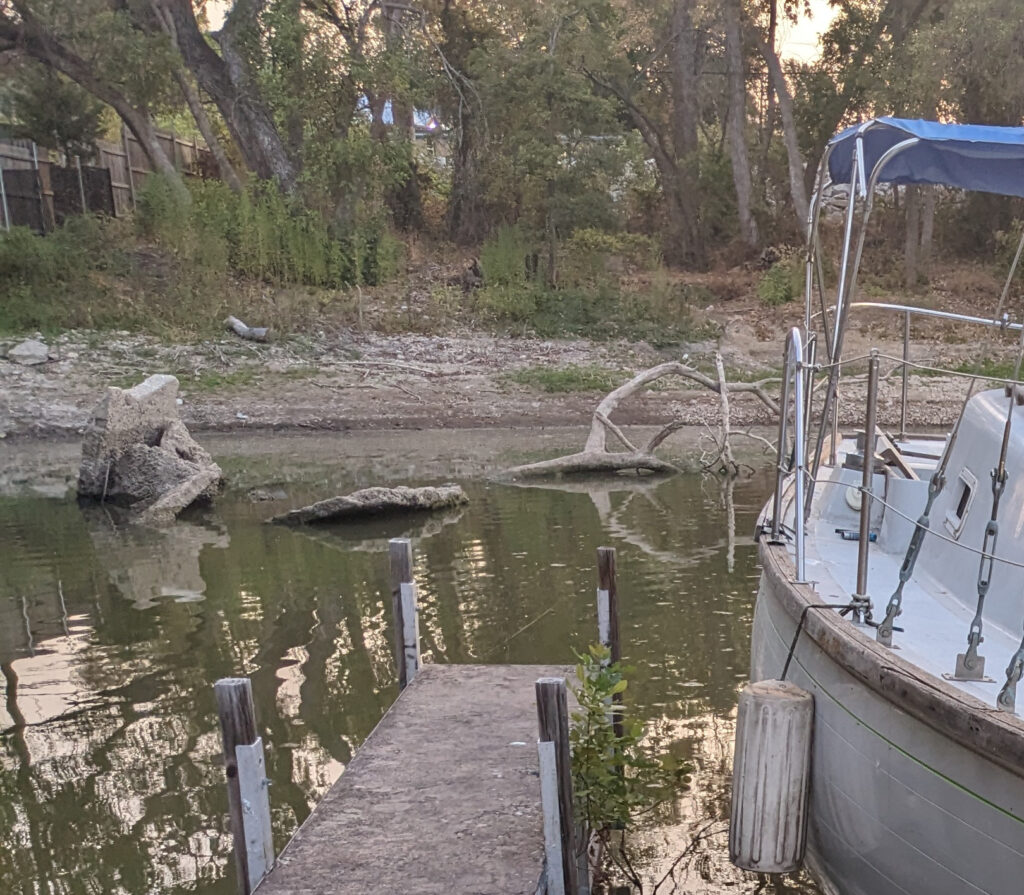The shallows and the deep
On Saturday, Brandon and I visited the marina where our sailboat lives. It was an eerie experience. Last month we followed the advice of our marina peeps and moved our boat to another slip. Our little cove was shrinking away during this summer’s long heat wave, with the water level dropping one foot per week.
This was our cove during healthy times in mid-April.
This is our cove now.
Unseen dangers that we’d bumped into in the past are now clearly visible and much larger than we realized. Much more dangerous. Look at the massive chunk of concrete. Look at the large tree limb. Where there was once beautiful water now stands an island (photo below). Where we could once sail freely, now we can’t. Our dock—once full—is now empty, except for the abandoned boat that leans at a pitiful angle as it rests on the bottom of the lake. The lake that’s evaporating—literally melting in the triple-digit heat with no rain.

The shallows and the deep
Today on Choosing Peace, we’ll explore The Shallows and The Deep. Strangely enough, when we look at our situation at the lake, The Shallows = truth and healing, while The Deep = denial. The Shallows are uncomfortable. Shocking, even. The Deep appears to be smooth sailing.
When the heat gets turned up, hidden things come into view.
Things we need to see and deal with. Things that won’t go away just because we’re ignoring them, calling them something they aren’t or making excuses. They won’t go away just because a lot of other people agree with us or because we’re joking about them.
In parts 1 thru 5, we’ve been digging into The Four Flavors of Denial: (1) Basic, plain-vanilla Denial, (2) Justifications and Excuses, (3) Us vs. Them, and (4) Gallows Humor. The time has come to dig into our own denial. Is something unseen lurking beneath the surface?
Questions and answers
In part 2, I asked some questions.
What about chronic sin—wrong thinking and living? What about my denial about my own sin? What about people who love their sin—people like my sociopathic in-laws? What about people who feel trapped by their sin? What about people who have willfully chosen satanic practices—the occult? Evil? Death? Destruction?
How does sin relate to trauma and loss?
Let’s start answering those questions from the bottom up.
1. How does sin relate to trauma and loss?
Sin is the seed. “Sin conceives and eventually gives birth to loss and trauma.” See more in this post. In other words, there are serious consequences for habitual, chronic sin and for one-time, traumatic sin.
When I looked at the next two questions, the answer to each one was the same.
2. What about people who have willfully chosen satanic practices—the occult? Evil? Death? Destruction?
3. What about people who love their sin—people like my sociopathic in-laws?
Are they innately different than we are? That depends. You’ll find a lot in the Bible about wolves and sheep, goats and sheep, and about the hardening of people’s hearts. How can we tell the actual wolves from the not-yet-sheep? In other words, how can we tell the truly evil—sold out/permanently evil—from people who just haven’t seen the light yet?
We can’t. But God can.
Discernment, questions, answers and the puzzle
That being said, we absolutely must consult God and use discernment. There are some very dangerous people out there—most of whom have never been arrested. When someone’s behavior leaves you feeling confused, afraid, angry, shocked, concerned, uncomfortable or uncertain about what to do, ask yourself these questions. What was said? What was not said? What was done? What was not done? And this is the clincher: What do these things tell you about this person’s character?
Asking and answering the right questions isn’t enough.
Put the puzzle pieces together.
Read this post for an example of how I put some puzzle pieces together. I had to write down the facts and figure out what they meant in order to lay down my denial and put the puzzle together. Then I knew who and what I was dealing with, so I could move forward in wisdom and confidence instead of in denial and confusion.
Change
Can a sociopath change? Can an evil person change? Yes. It is truly a miracle and it is extremely rare. Read this post and watch the testimony of David Wood. Nothing is impossible with God. Remember this important truth from the Sociopaths series.
Those who do evil and call it good are not to be trifled with.
4. What about my denial about my own sin?
5. What about people who feel trapped by their sin?
6. What about chronic sin—wrong thinking and living?
These three questions have the same answer. Drink in this section from Saying Good-bye in the Grieving series.
The impact of sin on trauma and loss
One key point that can’t be left out of this series is sin—thoughts, actions and non-actions that are contrary to God’s way. All four traumas that I unpacked in this series—abortion, child abuse, child neglect and spousal abuse/divorce—were the direct result of sin—wrong thinking and wrong living. None of these traumas were the result of a birth defect, a flood, a fire, etc. They were premeditated sin. Every single one of them. Plain and simple….
Sin conceives and eventually gives birth to loss and trauma.
Traumatic sin
Explore my best example of the journey from denial to healing in The Trauma of Abortion. It started with one-time, traumatic sin, which had painful, long-term consequences. Very long-term. Your story may include chronic sin.
The painful consequences for my sin can motivate me
to deal with the obvious and not-so-obvious problems
I’ve been trying so hard to avoid.
Healing and revealing
The healing happens in layers—one relationship or issue at a time. (Read about peeling The Trauma Onion here.) Do the work of grieving. Lay down your traumas and losses, one at a time. See the How-to list here and keep reading. Even after you’ve laid down all your unresolved traumas and losses, God can continue revealing amazing things to you. While I was writing Questions and Answers, part 2, the Lord showed me the truth about my inner, resting state—my old one and my new one.
Here’s some more from Saying Good-bye.
The way
As we’re forged by fire—becoming more and more like Jesus—and as we diligently do the work of grieving, we’ll find that these self-inflicted and/or sin-oriented traumas become less and less real in our lives because we’re living God’s way and not our way. Our way leads to trauma, despair and chaos. Our way is death.
God’s way leads to thriving, joy and peace.
His way is life.
Team evil and team good
People who’ve participated in atrocities can change. Sometimes God softens their hard hearts and they switch from Team Evil to Team Good. People like the apostle Paul. People like Abby Johnson, the former Planned Parenthood director who became a powerful voice for life. (See part 4 and part 5.)
What about you? Have you been playing for the wrong team?
Dances of denial
How about a better question. Have you been trying to play for both teams simultaneously? Have you been doing the dance? The Status Quo Dance? The Life Formula Dance? The This-Is-How-Families-Are-Supposed-to-Operate Dance? The people-pleasing I-Have-to-Play-The-Nice-Game-with-The-Wrong-People Dance? Have you? There are other dances. Have you been doing the I’m-One-Person-at-Home-and-Another-Person-at-Work Dance? Have you been doing another dysfunctional Dance of Denial?
 Lies, denial and vulnerability
Lies, denial and vulnerability
Denial is all about lies. And lies keep us from healing, and sometimes from forgiving. Lies are the primary tools of the enemy. When we believe lies, we fail to invest ourselves wisely in good relationships—failing to choose wisely, communicate wisely, problem-solve wisely, etc.
Lies also keep us from responsibly protecting ourselves—and sometimes other loved ones—from dangerous people. I have a lot of experience in that department. The first two series on Choosing Peace are all about identifying problem relationships, establishing healthy boundaries, grieving the traumas, and walking forward in healing and peace. Start the Sociopaths series here and the Grieving series here.
Your turn
How do these recent posts about denial relate to your life? Get out your journal and reflect on these questions. Take your time and dig for the answers. We need to tear down this barrier to forgiving—the barrier of denial. We have to lay down the lies and embrace the truth.
Is there a problem in your life that you’ve been denying? Have you been making excuses or justifications for yourself or someone else? Are you a part of a family group, a team or an organization that has gone in the wrong direction? Are you part of a destructive Us vs. Them group? Do you use dark humor? How? When? Why? What is the reality of this situation? Consider the sin that the Gallows Humor seeks to mask.
I’m going to restate these questions I asked earlier. They’re important.
Have you been trying to play for both teams simultaneously?
Have you been doing the dance? The Status Quo Dance? The Life Formula Dance? The This-Is-How-Families-Are-Supposed-to-Operate Dance? The people-pleasing I-Have-to-Play-The-Nice-Game-with-The-Wrong-People Dance? Have you? There are other dances. Have you been doing the I’m-One-Person-at-Home-and-Another-Person-at-Work Dance? Have you been doing another dysfunctional Dance of Denial?
Seeing in the shallows
The subtitle of this post is The Shallows and The Deep. When you’re sailing in a boat, the deep water feels comfortable; but dangers lie out of sight. In the shallows during a long heat wave—when the stress and pressures are high—we can feel uncomfortable; but the dangers are much more obvious.
Are you in denial? Is there an experience, a chapter, a season or a relationship in your life that concerns you? Something or someone you’re trying to manage, avoid or forget? Are you seeing the event or situation rightly? Are you calling it what it really is? Read this recent post, called The Right Name.
A difficult person
Are you dealing with a difficult person in your life? More than one? Write down your spontaneous answers to these questions.
1. Are you dealing with someone who leaves you feeling frustrated, confused and/or attacked?
2. Are you interacting with someone who volleys back and forth between mean behavior and seemingly-sweet behavior?
3. Is there someone you’re avoiding due to their unpredictable behavior?
4. Does someone accuse you of being an abuser and/or having caused trauma when the other person is actually the abuser?
5. Does this person ignore you most of the time and then show up when it’s a holiday or some other special event?
6. Is gift-giving used to control, manipulate or disregard you?
7. When this person extends an invitation, is it last-minute or otherwise inappropriate?
8. Does this person ruin family or group events at times?
9. Does this person lie and/or withhold key information?
10. Are you treated like a possession or a prop in a bad movie? Be here. Do this. Tell me how great I am.
11. Does this person blame his or her problems on other people?
12. Does this person apologize and never change?
13. Could this person be described as a troublemaker, dramatic and/or a creator of chaos?
14. Does this person complain a lot—expecting you to feel sorry for him or her?
15. Are your clearly-stated boundaries ignored?
The big question
If your answer to some of those questions was yes, it’s time to answer this all-important question. Are you dealing with a dangerous person who has a personality disorder? Remember—most violence is emotional, not physical.
What now?
Study the first series here on Choosing Peace and The Trauma of Child Abuse posts. Drink in the truth. Write down what you remember and what it tells you. Reflect on what this person’s behavior really means.
Put the puzzle pieces together.
If that list of questions felt eerily familiar and you’ve never acknowledged the truth, it’s time to lay down your denial, name the trauma rightly, and take The Healing Journey.
“You will know the truth, and the truth will make you free.”
John 8:32, New Heart English Bible
A word of encouragement
Peaceful Reader, if this post speaks truth into your difficult reality, be encouraged today. God knows you and your situation infinitely more than any of us could ever comprehend. If you’ve given your heart to Jesus, rest in these truths. Jesus—the Son of The Living God—is here to listen to you. He is here to help you. He is here to strengthen you. He is here to guide you. (If you don’t know Jesus yet, read the Thanksgiving posts and The Prayer posts.)
A prayer if you’re dealing with an emotionally-dangerous person
Lord, show me the truth. Bring experiences and interactions to my mind that make my situation clear to me. Give me the diligence to write down the puzzle pieces I need to see. Show me what they mean. Give me the right name for what I’m dealing with. Help me to cry the tears I need to cry. Give me the discernment to clearly see what is good and what is evil. Build my discernment through constant practice. Show me the boundaries I need to put in place. Give me the courage to draw the lines in the right places and to enforce them for my good and my safety—and for the good and safety of others. Help me to stop being a part of the problem. Show me how to choose wisely in all things. Thank you for loving me. I trust you. In the mighty name of Jesus, I pray. Amen.
The shallows
Stay in The Shallows. Look at the hidden realities. Ask and answer the hard questions. Search earnestly for the truth.
“Haven’t I commanded you? Be strong and of good courage. Do not be afraid, neither be dismayed: for the LORD your God is with you wherever you go.”
Joshua 1:9, New Heart English Bible
When we choose to live in The Shallows, we can experience remarkable joy and peace. Truth is the key to healing and thriving.
Stay in The Shallows.
The story behind this photo will be featured in this month’s newsletter later this week—plus a summary of each August post. Go to the Contact page to sign up.
Coming next: We’ll move on to the other three barriers to forgiving: Pride, fear and anger. I’m not sure what stories the Lord will bring to my mind to illustrate those barriers, but I know they’ll be good.
Thanks for reading and for Choosing Peace.
Truth from The Word: 1 Peter 5:7
Song: “I Lay It All” by Sovereign Grace
More: Sign up for my monthly newsletter here.


